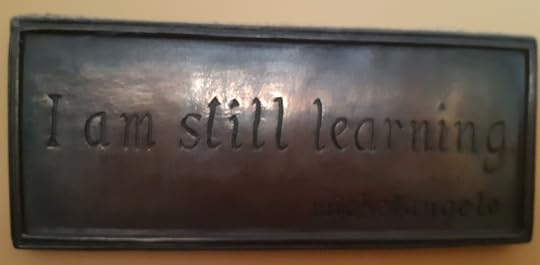Bringing Forth the History of the Word Education
Hello,
It’s exam season here in Ireland. It’s a commonly held belief (sadly not really supported by the evidence) that exam season brings us sunny, dry days. That has been the case for the last two weeks but 18 year olds are sitting their mathematics (paper 2) and Irish language (paper 1) today and it is currently raining. Thankfully neither of my offspring are sitting those state exams today. One survived the experience last year and the other has it looming over them for next year. My best wishes go to this year’s students and parents.
Taking seven exams to prove you learned something during six years of secondary level education is a scary concept to even the best student. University places are assigned purely (with exceptions for art portfolios and medicine aptitude tests) based on the results. Media and social attention to the results is high and heaps pressure on the teens.
As a result education is on my mind. I read “The Pride of Miss Jean Brodie” by Muriel Spark last year for my book reading challenge (details here). Jean is a controversial teacher and she holds forth in the book about etymology which naturally caused me to bookmark the page.
“The word education comes from the root e from ex, out, and duco, I lead. It means a leading out. To me education is a leading out of what is already there in the pupil’s soul.”
I was curious to discover if Miss Jean Brodie was correct, as elsewhere in the novella we discover her knowledge is somewhat patchy.
 “I am still learning” Michelangelo
“I am still learning” MichelangeloThe verb to educate joined English in the mid 1400s as educaten (to bring up children, to train). It came from educatus and educare (bring up, educate) in Latin. This Latin source gives us cousin words in Italian, Spanish, and French. Miss Brodie’s explanation of ex and duco is correct. Duco comes from the Proto Indo European root word deuk (to lead). However the “Century Dictionary” (originally published in the late 1800s) states the idea that education is about leading forth the child’s ability is a leap too far. Sorry, Miss Brodie.
By the 1500s we had the word education (child rearing or the training of animals) which English took from the word in French (there since the 1300s). Again this went back to Latin roots. Originally in English education related to learning manners and social codes rather than mathematics and language skills. By the 1600s the word had gained the meaning of systematic schooling and training for work.
Ultimately the story of the word education tells us that schooling has adapted to its times through the centuries. The Romans saw it as training, perhaps to fit students for roles in the rigid structure of Roman society and army? The French adopted it for child rearing. The English focused on manners and later on training for work. We may like the idea of education being about bringing a child’s potential to full fruit but many forms of education today still focus on skills for the workforce.
What do you think? What form of education is best? For me, I’d have to echo Michelangelo – “I am still learning”.
Until next time, happy reading, writing, and wordfooling,
Grace (@Wordfoolery)



